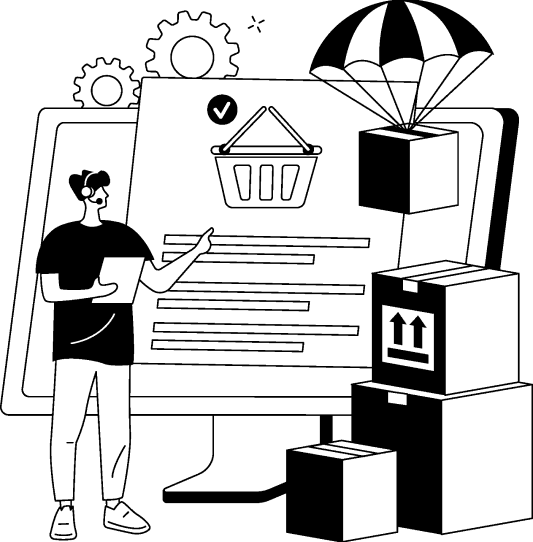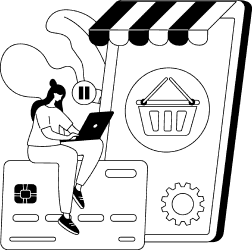- eCommerce App Development Market: A Quick Insight
- Types of eCommerce Apps Businesses
- Benefits of Developing an eCommerce App: Driving Growth and Enhancing Customer Connections
- 1. Increased Reach and Accessibility
- 2. Enhanced User Experience
- 3. Improved Customer Loyalty
- 4. Direct Marketing Channel
- 5. Enhanced Brand Presence
- 6. Rich Data Insights
- 7. Streamlined Sales Process
- 8. Increased Conversion Rates
- 9. Scalability
- Step-by-Step Process to Develop an eCommerce App
- 1. Market Research and Planning
- 2. Define User Requirements and App Features
- 3. UI/UX Design
- 4. App Development
- 5. Quality Assurance and Testing
- 6. Launch
- 7. Post-Launch Monitoring and Updates
- Must-Have Features of an eCommerce App
- User-Side Features
- Admin-Side Features
- Advanced Features to Set Your eCommerce App Apart from the Competitors
- AI-Powered Recommendations
- Augmented Reality (AR) Shopping
- Voice Search Capability
- Chatbots for Customer Service
- Dynamic Pricing and Offers
- Blockchain for Enhanced Security
- Advanced Analytics and Heat Maps
- Live Streaming and Video Content
- Social Media Integration and Sharing
- Robust Tech Stack to Create an eCommerce App
- Cost to Develop an eCommerce App: A Business Insight
- eCommerce Application Development Trends Businesses Can Leverage to Get Maximum ROI
- 1. AI-Powered Personalization
- 2. Voice Commerce
- 3. Augmented Reality (AR) Shopping
- 4. One-Click Checkout
- 5. Chatbots and Virtual Assistants
- 6. Omnichannel Experience
- 7. Progressive Web Apps (PWA)
- 8. Social Commerce Integration
- 9. Sustainability and Ethical Shopping
- 10. Subscription Models
- Challenges of Ecommerce App Development Businesses Face
- 1. Choosing the Right Tech Stack
- 2. Balancing Features and Budget
- 3. Delivering a Great User Experience
- 4. Ensuring App Security
- 5. Managing Product Inventory Efficiently
- 6. Cross-Platform Compatibility
- 7. Keeping Up with Technology Trends
- 8. Post-Launch Maintenance
- Why Appinventiv Is the Smartest Choice for Your eCommerce App Development Needs?
- 1. Adidas eCommerce App
- 2. 6th Street eCommerce App
- 3. Edamama eCommerce App
- FAQs
2025 is shaping up to be the year of eCommerce, and nobody can deny this. Global online retail sales are on track to reach the $8 trillion mark by 2027, expected to grow by 39%. Furthermore, analysts also expect more than 42% of the world’s population to buy something online this year, which is a record in scale and spending power. From quick‑commerce groceries arriving in minutes to high‑ticket luxury purchases made on a lunch break, digital storefronts have moved from “just being there” to core revenue engines for brands of every size.
The timing could not be better for businesses still debating an entry into eCommerce.
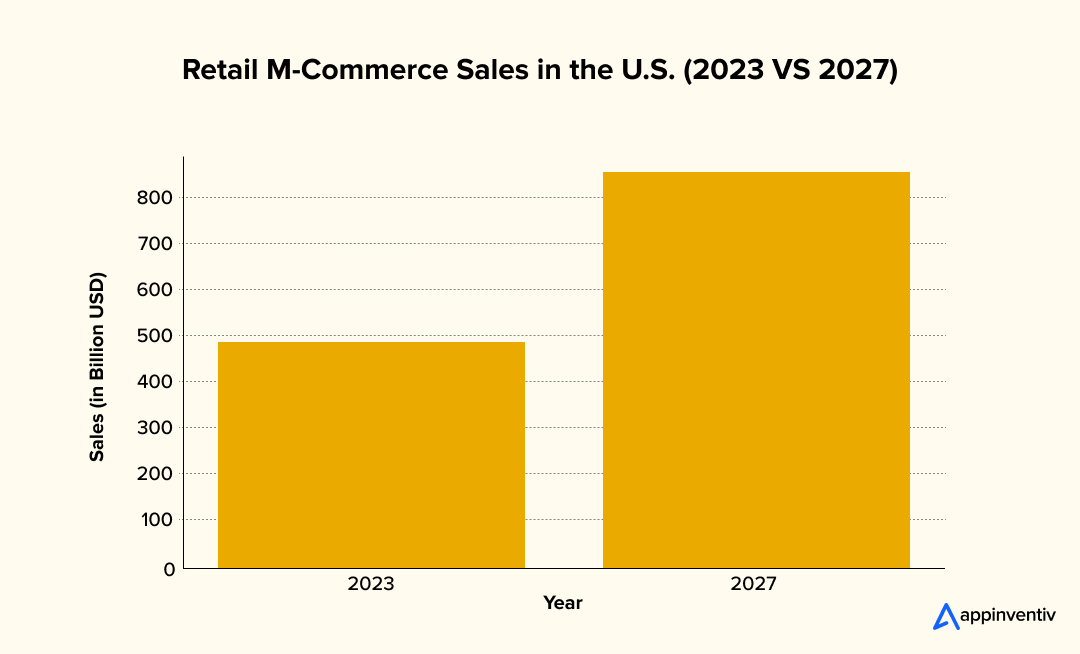
Social‑commerce features, AI‑powered chat, and tailored push notifications are now regular customer expectations, and mobile shopping alone is projected to reach $856 billion in sales in 2027. With fast, secure payment options, streamlined international shipping, and reliable cloud infrastructure, the complexity of launching an online store has dropped sharply, making it far easier to go live and start selling.
Today’s shoppers embrace a true “couch mentality.” For instance, they browse, compare, and buy without ever getting up. To meet all these expectations, a well‑built eCommerce app is essential. It keeps your store open 24/7 on customers’ devices, combining smooth design with real‑time stock updates, AI‑driven product suggestions, and one‑tap checkout. The result? Casual visitors become loyal buyers, and each purchase adds more long‑term value to your brand.
Suppose you are a business ready to decode every step of custom eCommerce application development, from deciding on the type of application you wish to develop to understanding the related costs. In that case, you are in exactly the right place. This ecommerce app development guide is your ultimate, no‑fluff guide to building an eCommerce app that wins in 2025 and beyond.
So, let’s first examine the statistics of eCommerce app development and how they highlight the growing demand, user behavior trends, and immense potential for businesses ready to make their mark in the digital marketplace.
eCommerce App Development Market: A Quick Insight
Today’s Business leaders, especially CMOs, CTOs, and founders, don’t just go by instinct. Before investing time and capital into a new digital venture, they want data, clear proof that the market is growing, the user base is ready, and the technology is worth the investment.
If you are one of those decision-makers evaluating whether eCommerce application development is the right move, let the numbers below speak for themselves. From global revenue projections to the latest behavior shifts, these statistics reveal why now is the perfect time to build and launch your eCommerce app.
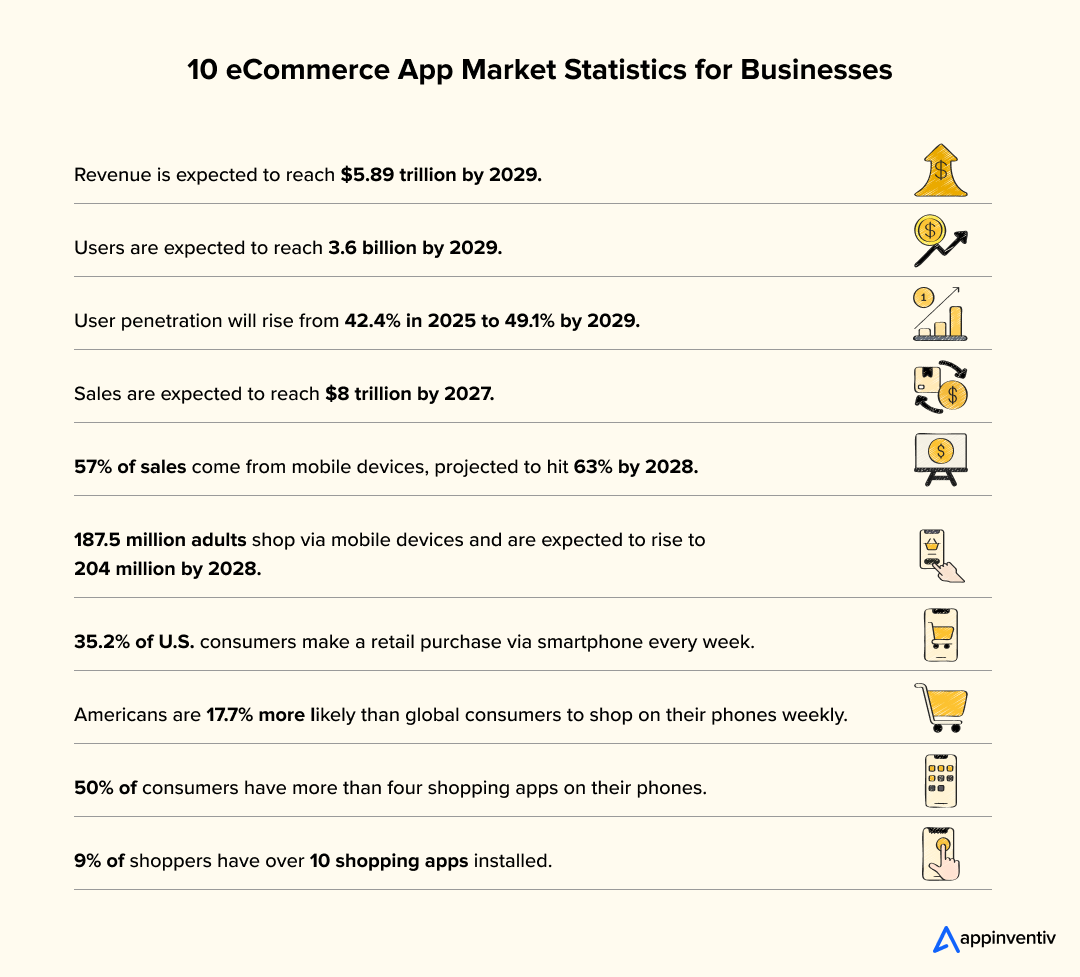
Now, why are these numbers climbing?
A simplistic combination of technological ease, consumer behavior, and digital-first infrastructure is fueling this upward trend. Faster smartphones, personalized shopping experiences, seamless mobile payments, and 24/7 product access make online shopping more appealing than ever. Additionally, innovations like AI-powered recommendations, one-click checkouts, and real-time inventory tracking continue to raise consumer expectations and satisfaction.
This surge isn’t just a trend but a clear signal for businesses. As consumers shift toward mobile-first shopping habits, eCommerce apps have become a key gateway to capturing attention and driving revenue. By investing in eCommerce mobile app development now, brands can secure long-term customer loyalty, tap into untapped markets, and future-proof their digital presence in one of the fastest-growing sectors globally.
Now, before diving into the specifics of eCommerce mobile app development, let us help you understand the types of eCommerce apps you can develop for your business.
Types of eCommerce Apps Businesses
In the ever-evolving digital marketplace, businesses have the opportunity to cater to diverse consumer needs through various types of eCommerce applications. Each type of app serves unique customer preferences and shopping behaviors, enabling businesses to tailor their strategies for maximum engagement and profitability.
| Type of App | Description | Real-World Examples |
|---|---|---|
| B2C (Business-to-Consumer) | Apps that facilitate transactions between businesses and individual consumers, offering a wide range of products and a seamless shopping experience. | Amazon, Walmart |
| B2B (Business-to-Business) | These apps are designed for the exchange of goods and services between businesses. They focus on bulk transactions, supply chain management, and business customer relations. | Alibaba, ThomasNet |
| C2C (Consumer-to-Consumer) | Platforms enabling consumers to sell goods or services to each other are often used for second-hand goods or handmade items. | eBay, Etsy |
| Social Commerce Apps | eCommerce apps integrated with social media features, allowing users to buy products directly through social platforms. | Instagram Shopping, Facebook Marketplace |
| Subscription-Based Apps | Apps that offer products or services on a subscription basis, providing continual service in return for recurring payment. | Birchbox, Blue Apron |
Benefits of Developing an eCommerce App: Driving Growth and Enhancing Customer Connections
eCommerce application development offers many benefits that can significantly enhance business operations, improve customer experiences, and boost overall profitability. Here are some key advantages:
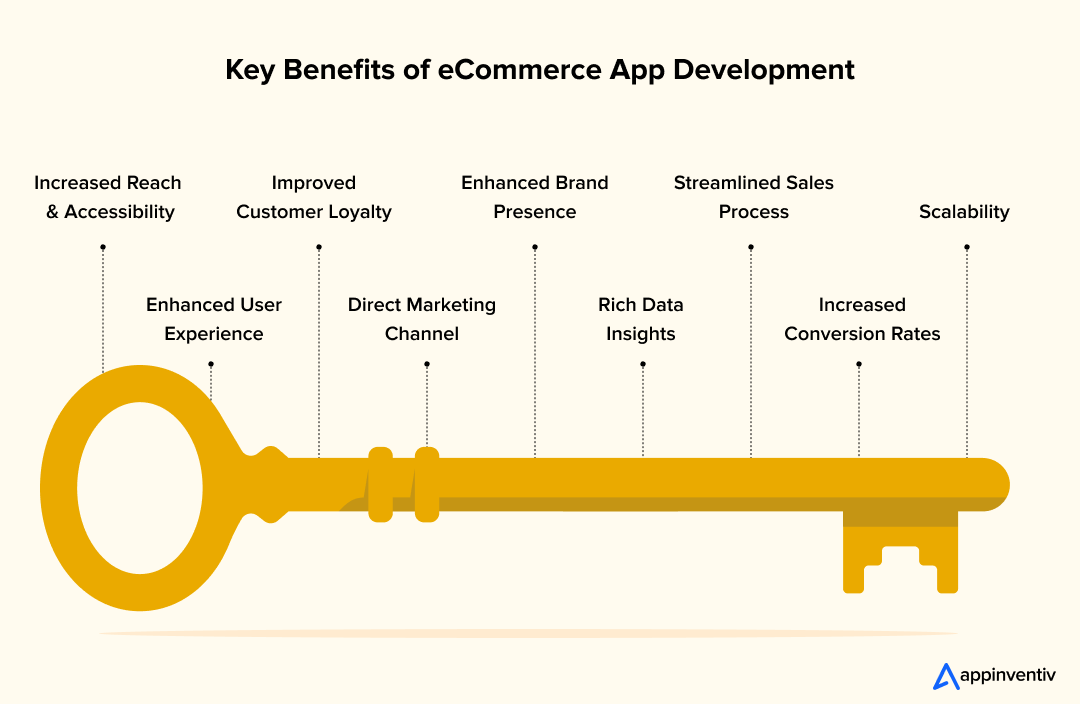
1. Increased Reach and Accessibility
One of the major advantages of eCommerce mobile app development is increased user reach and accessibility. A custom app puts your business in the pocket of millions worldwide, breaking geographical barriers. Customers can access your store anytime, anywhere, significantly expanding your market reach and increasing the potential for sales.
2. Enhanced User Experience
Mobile apps are designed for ease of use. With an intuitive interface, quick loading times, and smooth navigation, eCommerce apps enhance the shopping experience, leading to higher customer satisfaction and retention rates.
3. Improved Customer Loyalty
Highly advantageous benefits of eCommerce mobile app development for businesses is increased customer loyalty. Apps facilitate loyalty programs by integrating features such as points, rewards, and push notifications for special offers. These features encourage repeat visits and purchases, fostering a loyal customer base.
4. Direct Marketing Channel
Mobile app development for eCommerce businesses also allows the stakeholders to leverage them as direct marketing channels with the help of push notifications. Companies can send real-time updates about new products, promotions, and events directly to customers’ devices, increasing engagement rates.
5. Enhanced Brand Presence
eCommerce application development can help businesses enhance their brand presence in the market. For instance, having a dedicated app in this tech-savvy and customer-focused market reinforces your brand identity whenever the user accesses their device, keeping your app at the top of the game.
6. Rich Data Insights
Apps provide valuable insights into customer behavior, preferences, and buying patterns. This data is crucial for making informed decisions, personalizing marketing strategies, and optimizing the product offering.
7. Streamlined Sales Process
Mobile apps streamline the buying process with features like one-tap checkout, saved payment methods, and easy navigation. This convenience can significantly reduce the customer’s journey time, leading to higher conversion rates.
8. Increased Conversion Rates
Apps are more effective in converting users into buyers than websites. For example, if businesses consider mobile app development for eCommerce, the result would create a product that can offer faster load times, personalized experiences, and one-click checkouts, all of which significantly boost conversion rates.
9. Scalability
As your business grows, an eCommerce app can scale to meet increasing demand without compromising performance. Apps can handle many transactions and interactions simultaneously, ensuring your business operates smoothly.
Step-by-Step Process to Develop an eCommerce App
How to build an ecommerce app is a strategic process that combines technical expertise with business insight. It involves several critical steps, each designed to ensure the app functions efficiently and also delivers a superior user experience:
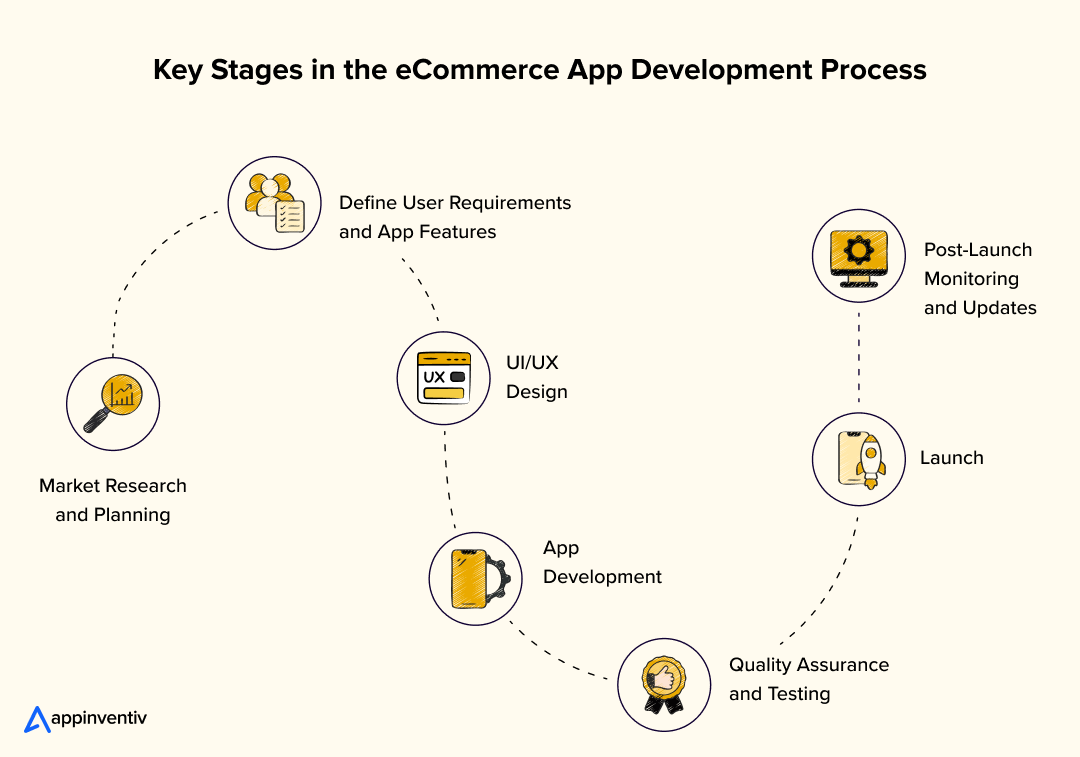
1. Market Research and Planning
The process to build an ecommerce app begins by understanding your market, identifying target customers, and analyzing competitors. This step helps to pinpoint the features your app must have and the unique value proposition you can offer. Thorough research aids in crafting a strategic plan that outlines the app’s objectives, key performance indicators, and overall goals.
2. Define User Requirements and App Features
Based on the insights gained from market research, define your users’ specific requirements. List the essential features your app should have, such as user registration, product catalog, search and filter options, a shopping cart, payment gateway integration, and customer support. Prioritizing these features will guide the development process.
3. UI/UX Design
The eCommerce app development design phase focuses on creating an intuitive and engaging user interface (UI) and a seamless user experience (UX). In this mobile commerce app development phase, businesses should ensure the app is easy to navigate, aesthetically pleasing, and aligns with the brand’s visual identity. Effective UI/UX design enhances user engagement and retention, making shopping and completing purchases easier.
4. App Development
This stage involves the actual coding and programming of the app. Businesses should choose the right technology stack and follow best practices to build a stable and scalable app. It’s crucial to develop both a frontend that users interact with and a backend that manages data and integrates with other systems like inventory and payment processing.
5. Quality Assurance and Testing
Testing ensures the app is bug-free and performs well under various scenarios. Quality assurance involves multiple types of tests, including functional testing, usability testing, performance testing, and security testing. Thorough testing helps to identify and fix any issues before the app goes live.
6. Launch
Once the app passes all the tests, this phase of eCommerce application development calls for the launch of app stores like Google Play and the Apple App Store. Prepare marketing materials and press releases to promote the launch. Ensure you have a support team ready to handle any customer inquiries or issues that arise post-launch.
7. Post-Launch Monitoring and Updates
After the launch, continuously monitor the app’s performance and gather user feedback. Use this feedback to make necessary updates and improvements. Regular updates fix bugs and introduce new features that meet evolving user needs, keeping the app relevant and competitive.
Now that you have a clear idea of how to develop eCommerce apps, let us move ahead and look into the features of eCommerce apps that can help them gain immediate traction in this digital marketplace.
Also Read: How to Build a Quick Commerce App? Features, Process, Costs
Must-Have Features of an eCommerce App
In the competitive world of online shopping, having a robust and feature-rich eCommerce app is essential for attracting and retaining customers. Here are some crucial eCommerce mobile app features that every business should include to ensure a seamless and engaging shopping experience for its customers:
User-Side Features
For the user side, an eCommerce app must be intuitive, engaging, and straightforward, making shopping an enjoyable and hassle-free experience. Here are the fundamental user-side features:
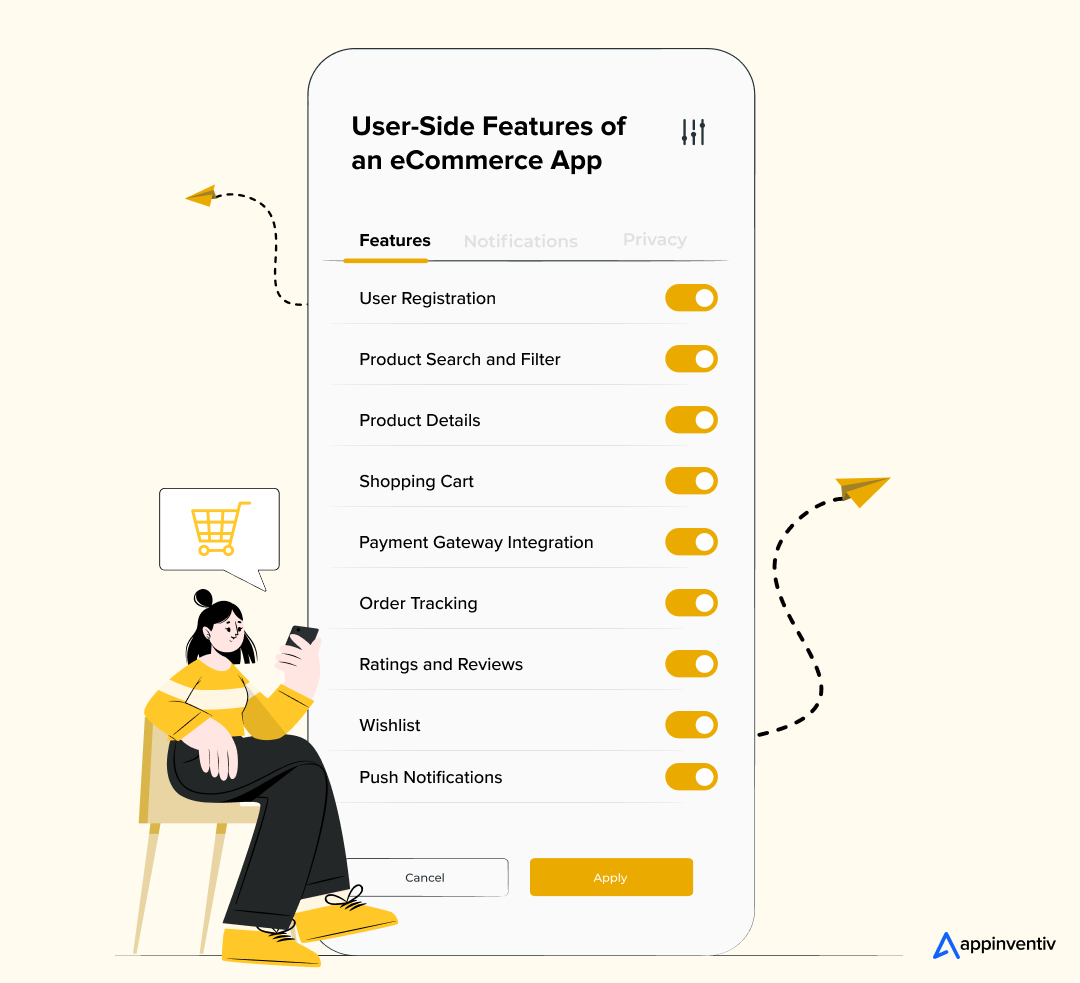
- User Registration: Allows users to create a personal account to manage orders, payments, and preferences more easily.
- Product Search and Filter: A powerful search engine with multiple filter options helps users quickly find exactly what they want.
- Product Details: Each product should have a detailed page with high-quality images, descriptions, prices, and options like size or color.
- Shopping Cart: Users can review their selections, make modifications, and proceed to checkout smoothly.
- Payment Gateway Integration: Secure and versatile payment options, including credit cards, digital wallets, and net banking, ensure a smooth transaction process.
- Order Tracking: Enables customers to track the status of their orders from processing to delivery, enhancing transparency.
- Ratings and Reviews: This feature allows customers to read and write reviews about products, fostering trust and aiding in informed decision-making.
- Wishlist: Users can save items for later purchase, providing valuable data for personalized marketing.
- Push Notifications: Keep users engaged by sending them alerts about new products, special offers, and events.
Admin-Side Features
On the administration side, the app should offer tools that help business owners and operators manage their online stores efficiently. Here are essential admin-side features:
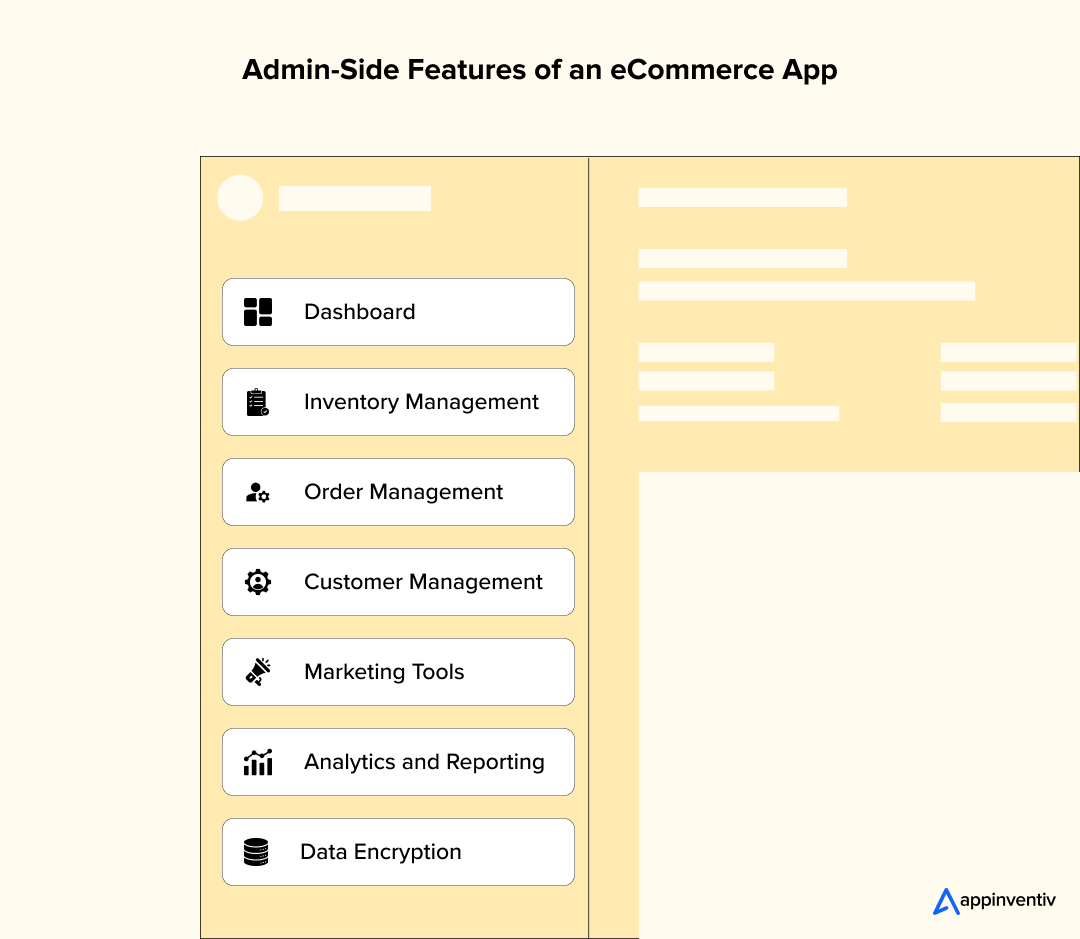
- Dashboard: A central hub for monitoring business performance, including sales statistics, inventory levels, and customer activity.
- Inventory Management: Paves the way for adding, updating, and organizing product listings, including descriptions, categories, and prices.
- Order Management: Allows for the processing of orders, updating of statuses, and handling of returns and exchanges efficiently.
- Customer Management: The admin can view customer profiles, purchase history, and feedback, which are essential for effective customer relationship management.
- Marketing Tools: Capabilities to run promotions and discounts, manage email campaigns, and implement loyalty programs directly from the app.
- Analytics and Reporting: This feature integrated during the eCommerce mobile app development process provides insights into sales trends, customer behavior, and overall app performance, helping to make informed business decisions.
- Data Encryption: Ensures all transactions and customer data are securely handled to protect against fraud and breaches.
After looking into the various eCommerce app features for startups and enterprises, let us help you understand various advanced features that can pave the way for your app to get maximum traction in the market.
Advanced Features to Set Your eCommerce App Apart from the Competitors
In a saturated market, distinguishing your eCommerce app from competitors is crucial. Integrating advanced features, especially those leveraging AI and other emerging technologies, can significantly enhance user engagement and operational efficiency. Here are some innovative features that can give your app a competitive edge:
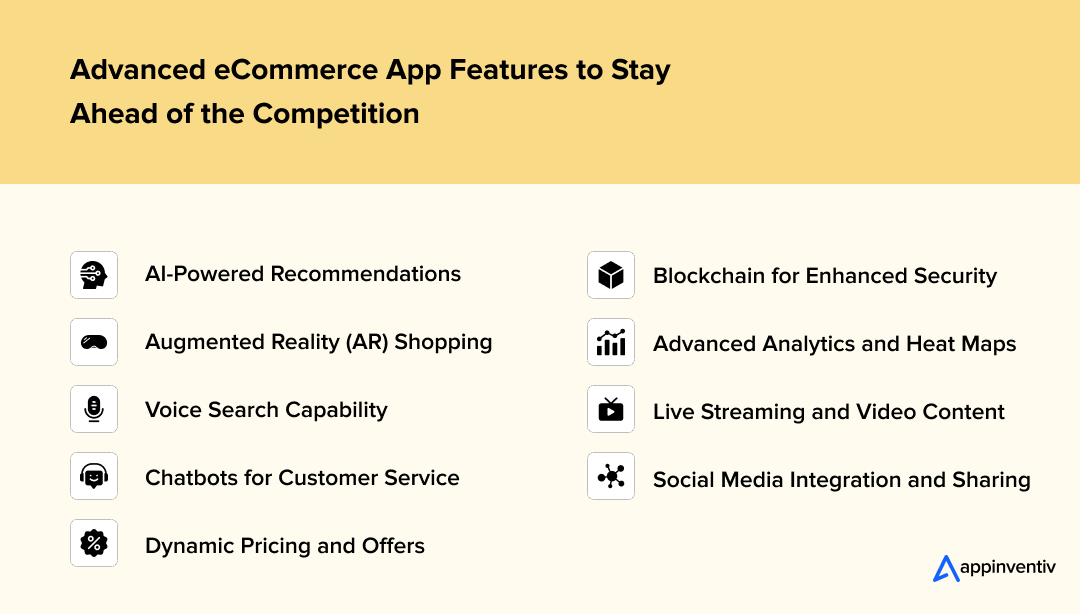
AI-Powered Recommendations
Utilizes machine learning algorithms to analyze user behavior and preferences to suggest personalized product recommendations, enhancing the shopping experience and increasing sales.
[Also Read: AI in eCommerce: AI Trends and Use Cases Redefining Online Shopping Experiences]
Augmented Reality (AR) Shopping
AR allows customers to visualize products in a real-world context, such as seeing how a piece of furniture would look in their living room or how a garment fits, before making a purchase.
Voice Search Capability
Integrates voice recognition technology to enable users to search for products using voice commands, making the app more accessible and improving user convenience.
Chatbots for Customer Service
It implements AI-driven chatbots to provide instant customer support, answer FAQs, and assist in the shopping process. The chatbots are available 24/7.
Dynamic Pricing and Offers
It uses AI to adjust prices and offers dynamically based on market demand, user behavior, and inventory levels, maximizing profit margins while still appealing to consumers.
Blockchain for Enhanced Security
Employs blockchain technology to manage transactions and protect against fraud, ensuring a secure and transparent purchasing process for users.
Advanced Analytics and Heat Maps
It provides detailed insights into how users interact with the app, identifying hot spots and bottlenecks. This information can be invaluable for optimizing app layout and improving user flows.
[Also Read: eCommerce Analytics – Boosting Conversions and Sales with the Power of Data]
Live Streaming and Video Content
Integrates live streaming for product launches or video content for product demonstrations to engage users and provide a richer content experience.
Social Media Integration and Sharing
Facilitates easy sharing of products or wish lists on social media platforms, which helps in viral marketing and leverages social proof to attract new customers.
Robust Tech Stack to Create an eCommerce App
Although when it comes to choosing a tech stack, every eCommerce mobile app developer has their preference regarding expertise and cost of acquiring them. At Appinventiv, we use the following technology stack for cross-platform eCommerce app development:
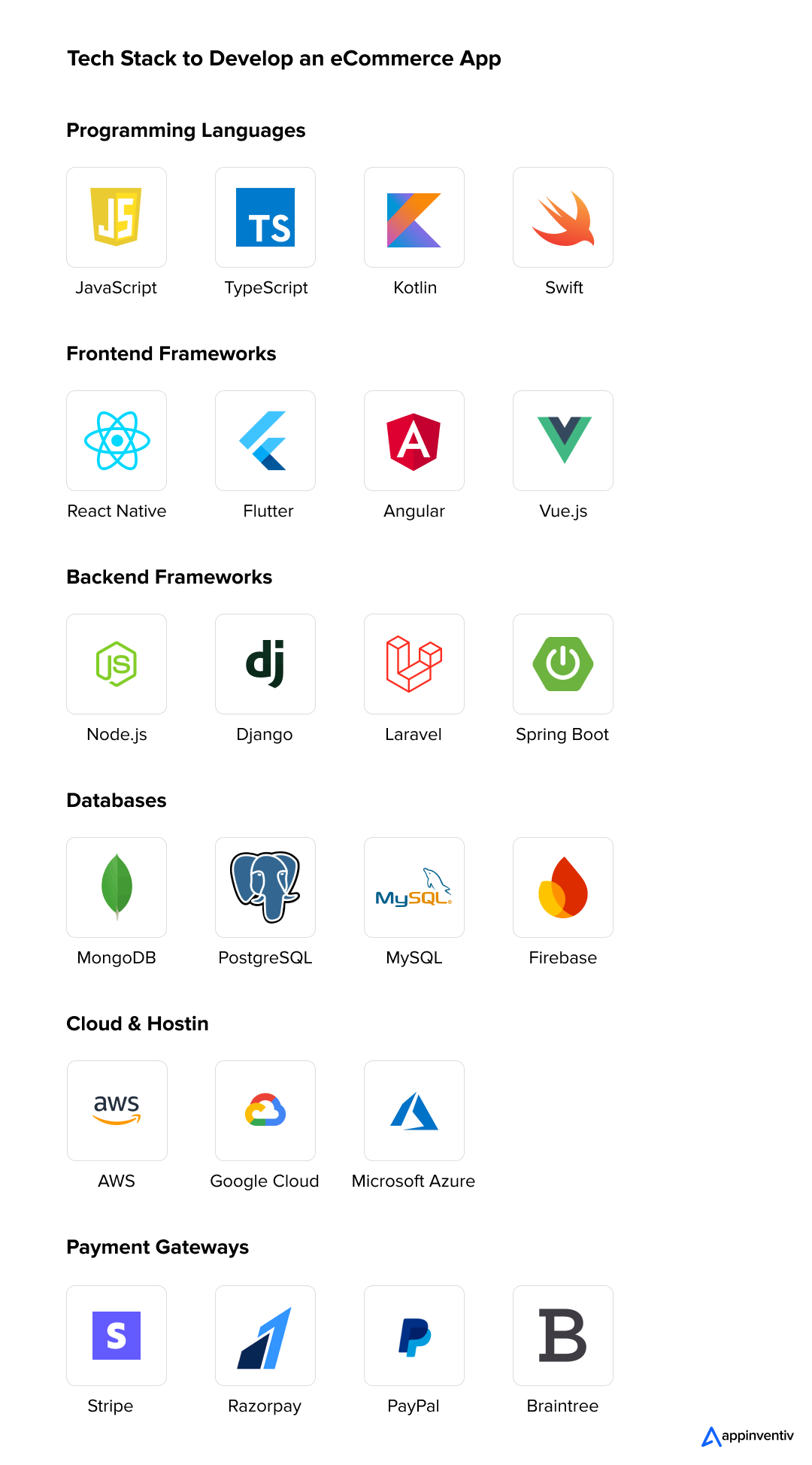
Cost to Develop an eCommerce App: A Business Insight
The overall eCommerce app development cost typically ranges from $35,000 to $200,000, depending on the app’s complexity, feature set, design, platform (iOS, Android, or both), and the expertise of your development team.
Several other factors also influence the cost to create an eCommerce app, such as the type of app, the number of features, the level of customization required, and whether you hire a freelance ecommerce mobile app developer, an in-house team, or a full-fledged development agency.
A simple formula that you can use to estimate the overall mobile eCommerce app development cost is:
Total Cost of Developing an eCommerce App = (Total Development Hours) × (Hourly Rate of Developers)
Now, let us offer you a quick insight into the estimated cost associated with each stage of eCommerce application development. This breakdown of eCommerce mobile application development cost will help you plan your budget more effectively:
| Development Stage | Estimated Cost Range |
|---|---|
| Market Research & Planning | $2,000 – $5,000 |
| UI/UX Design | $3,000 – $10,000 |
| Frontend Development | $6,000 – $25,000 |
| Backend Development | $8,000 – $30,000 |
| Payment Gateway Integration | $1,000 – $5,000 |
| Basic eCommerce Features | $5,000 – $20,000 |
| Admin Panel Development | $3,000 – $8,000 |
| Testing & QA | $2,000 – $8,000 |
| Deployment & Launch | $1,000 – $3,000 |
| Post-Launch Support & Updates | $3,000 – $10,000/year |
For advanced insight into the costs, you can also check out our blog on How much does it cost to build an e-commerce app.
After looking into the eCommerce mobile app development costs associated with multiple app development stages, let us understand the eCommerce app development trends in detail.
eCommerce Application Development Trends Businesses Can Leverage to Get Maximum ROI
To stay ahead in the competitive digital marketplace, businesses must adopt the latest trends that enhance user experience and maximize return on investment. Here are the most impactful eCommerce app development trends worth exploring:
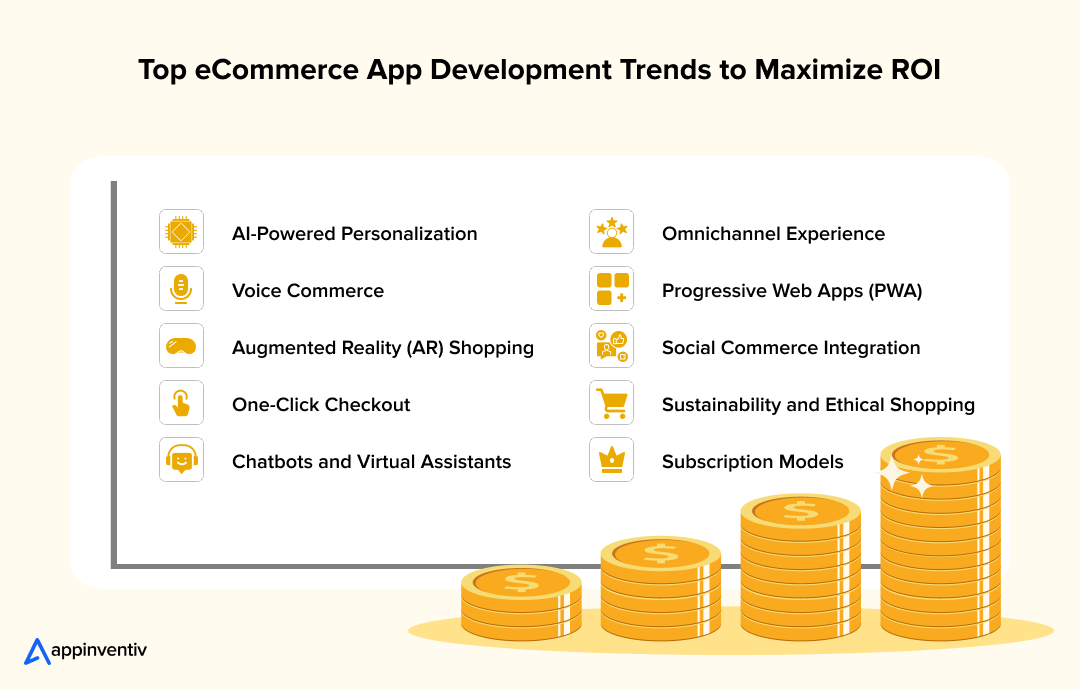
1. AI-Powered Personalization
AI algorithms track user behavior to offer product suggestions, deals, and content tailored to each shopper. This increases engagement, boosts sales, and enhances the overall user experience.
According to McKinsey, leading businesses use AI and GenAI to scale personalized marketing. Around 71% of consumers expect personalized experiences, and 76% get frustrated when they don’t receive them. Thus, adding smart personalization to your app is no longer a nice-to-have feature, but it keeps users returning for more.
2. Voice Commerce
With the rise of voice assistants like Alexa and Siri, voice search is becoming popular in shopping apps. Adding voice-enabled features can improve accessibility and offer a hands-free browsing experience.
Gartner’s Hype Cycle for Digital Commerce highlights voice commerce as a rising technology, signaling a major opportunity for businesses to enhance customer interactions and stay ahead by integrating voice-enabled experiences into their operations. Thus, embracing voice commerce can turn everyday moments into shopping opportunities and position your brand right where your users are speaking.
3. Augmented Reality (AR) Shopping
AR allows users to try products like clothes and furniture virtually before buying. This reduces returns and builds confidence in online purchases.
According to McKinsey, brands that successfully adopt AR within a direct-to-consumer (DTC) model gain a competitive edge by offering interactive, real-time product experiences, ultimately boosting conversions and customer loyalty. For instance, L’Oréal’s AR try-on service allowed users to test makeup and hair color virtually, significantly increasing usage. Thus, it’s high time for businesses to understand that integrating AR turns browsing into an immersive journey that boosts trust and sales, without needing a physical trial.
4. One-Click Checkout
Simplifying the payment process with one-click checkout reduces cart abandonment and increases conversions. It makes shopping quicker and more convenient for users.
5. Chatbots and Virtual Assistants
AI-powered chatbots provide instant customer support, answer questions, and guide users through purchases. This 24/7 assistance boosts customer satisfaction and reduces service costs.
A latest McKinsey report highlights that with advanced conversational capabilities, Gen AI-powered chatbots can act as intelligent shopping assistants, guiding users, answering questions, and even recommending products. They could potentially become a key sales channel for modern eCommerce businesses. Simply put, for eCommerce businesses, adding a chatbot is like hiring a smart, tireless salesperson who never sleeps and always closes.
6. Omnichannel Experience
Integrating your app with other channels like websites, social media, and offline stores ensures a consistent customer journey. It helps retain customers and increase repeat purchases.
7. Progressive Web Apps (PWA)
PWAs offer an app-like experience through web browsers without requiring installation. ecommerce web application development enables the fastest load, works offline, and is ideal for reaching users in areas with low connectivity.
8. Social Commerce Integration
Adding features that connect your app with social platforms helps users share products and shop directly from social feeds. This increases visibility and drives organic traffic.
According to a Gartner report, integrating shopping experiences directly within social media platforms helps brands tap into high user engagement and convert attention into action. The report reveals that over 71% of providers using AI-driven one-to-one personalization saw increased market share, emphasizing how AI and automation transform marketplace experiences and drive real business growth. Thus, making your app social-friendly helps you reach more people and grow through easy sharing and built-in audiences.
9. Sustainability and Ethical Shopping
Consumers today prefer eco-friendly and ethical brands. Highlighting practices within your app, such as carbon-neutral shipping or local sourcing, can attract more conscious buyers.
According to McKinsey, today’s shoppers expect brands to back their sustainability promises with real action. Products with environmental, social, and governance (ESG) claims see 1.7% higher sales growth than those without. This reflects a growing consumer trend where eco-consciousness directly influences purchase decisions and brand loyalty. Well, to say the least, building transparency and ethics into your app isn’t just good for the planet, it’s great for business too.
10. Subscription Models
Apps offering subscription-based shopping, such as monthly boxes or auto-refills, can build consistent revenue and customer loyalty while reducing churn.
Challenges of Ecommerce App Development Businesses Face
While developing an eCommerce app offers huge growth potential, businesses often face several roadblocks along the way. Understanding the challenges of eCommerce application development and how to solve them is key to building a successful, customer-ready platform.
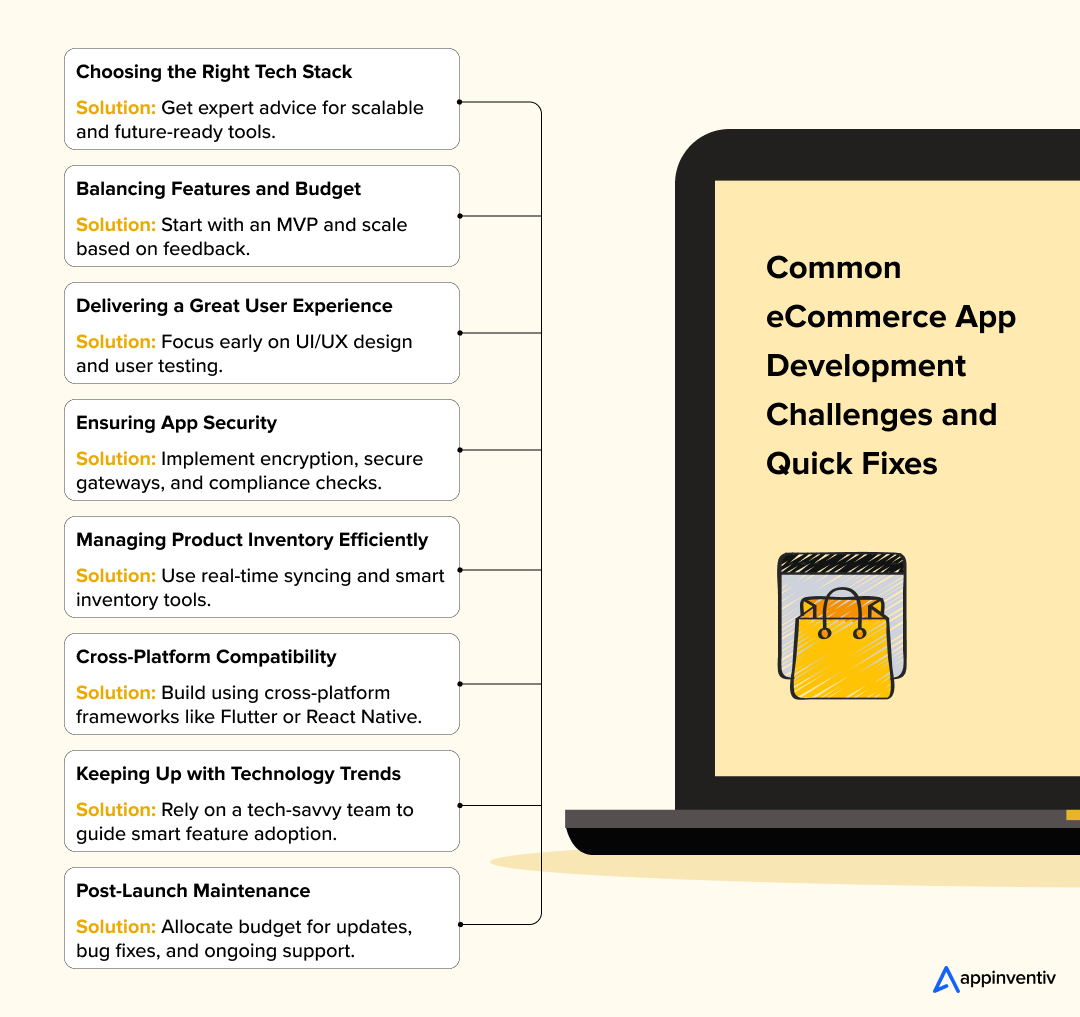
1. Choosing the Right Tech Stack
Many businesses struggle with selecting the right programming languages, frameworks, and tools for their app.
Solution: Consult with experienced developers or a trusted tech partner to assess your app’s needs and choose a scalable, future-ready tech stack.
2. Balancing Features and Budget
Adding too many features at once can inflate costs and delay the launch, while too few can leave users unimpressed.
Solution: Start with a Minimum Viable Product (MVP) that includes only core features and add advanced ones based on user feedback and budget availability.
3. Delivering a Great User Experience
Designing an app that is visually appealing, fast, and easy to use is often a challenge for first-time app builders.
Solution: Invest in UI/UX design early in the process and conduct user testing to refine app navigation and usability before launch.
4. Ensuring App Security
Handling personal and financial data during the eCommerce app development process requires strong security measures, or you risk losing customer trust.
Solution: Use secure payment gateways, encrypt data, follow GDPR compliance, and conduct regular security audits.
5. Managing Product Inventory Efficiently
Without a reliable backend system, tracking stock, orders, and updates becomes chaotic as you scale.
Solution: Integrate inventory management software or build a custom backend during the eCommerce web application development process that syncs stock levels across all platforms in real time.
6. Cross-Platform Compatibility
Building a smooth app experience during eCommerce android app development and eCommerce iOS app development process can be time-consuming and complex.
Solution: Use cross-platform development frameworks like Flutter or React Native to build one app that works well across multiple platforms.
7. Keeping Up with Technology Trends
Technology is evolving fast, and it’s tough to know which trends are worth adopting and which are hype.
Solution: Work with a development team that has a dedicated team of eCommerce mobile app developers who stay updated on industry trends and can help you integrate only those technologies that align with your business goals.
8. Post-Launch Maintenance
Many businesses underestimate the effort and cost needed to keep the app updated, bug-free, and relevant post-launch.
Solution: Set aside part of your budget for regular updates, performance monitoring, and customer support to ensure the long-term success of your app.
Why Appinventiv Is the Smartest Choice for Your eCommerce App Development Needs?
We hope this eCommerce app development guide has helped you understand everything related to eCommerce apps, from market trends and must-have features to costs and challenges.
The competition is fierce in a market expected to hit $6.8 trillion in global sales by 2025, and only those businesses with smart digital infrastructure will thrive. At Appinventiv, we help brands not just enter the eCommerce space but stand out and scale fast with expertly crafted, feature-rich, and future-ready eCommerce apps.
Here’s what sets us apart:
- End-to-End Delivery, Zero Guesswork: From planning to post-launch optimization, we cover the full lifecycle so you don’t have to juggle teams.
- Mobile-First, Conversion-Focused: With mobile driving 63% of global sales by 2028, our apps are built for performance, speed, and retention.
- AI, AR & GenAI That Convert: We build apps with AI-driven recommendations, AR try-ons, and AI-powered assistants, so you meet user expectations and drive ROI.
- Secure, Scalable, Future-Proof: Our robust backend, real-time inventory, and one-click checkout are designed to scale with your growth.
- Strategy-Driven for Every Business Type: Whether you are building a B2B, B2C, C2C, subscription-based, or social commerce app, we customize every solution to your business model and market needs.
As a leading eCommerce app development company, we have helped a range of well-established eCommerce stores gather digital success.
1. Adidas eCommerce App
We worked on the end-to-end creation of the Adidas application where we worked on complex animations and video components to give it a YouTube-like interface. The app led to 2+ million downloads and the acquisition of 500k new users.
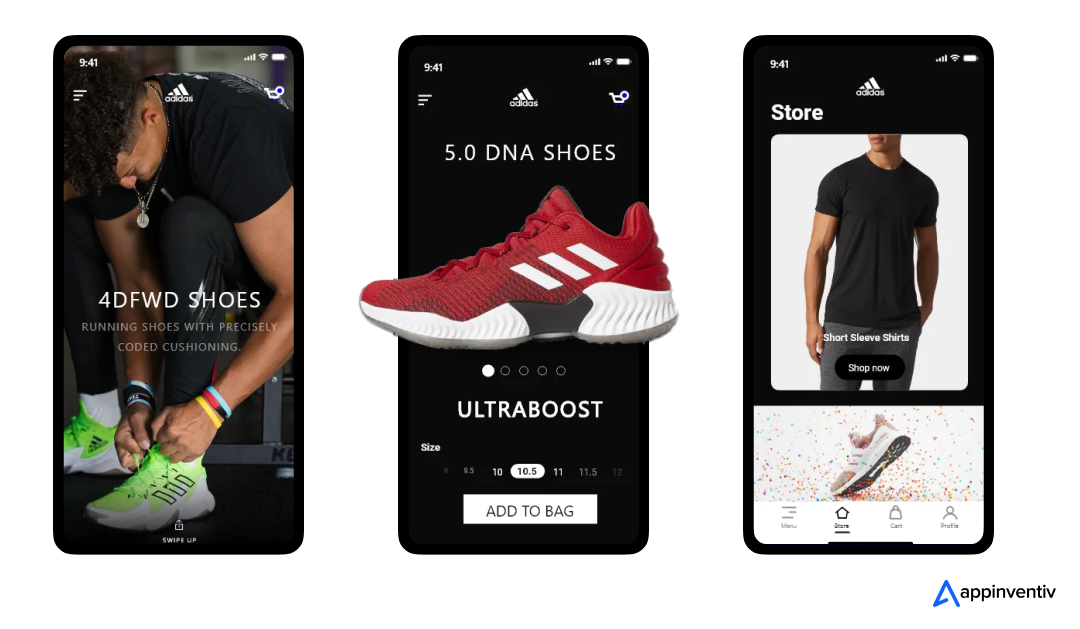
2. 6th Street eCommerce App
We helped 6th Street, an eCommerce app, to lower its loading time to 3 seconds and revamp the entire app module with new features for a better user experience. The efforts led to 3+ million iOS and 1+ million Android downloads.
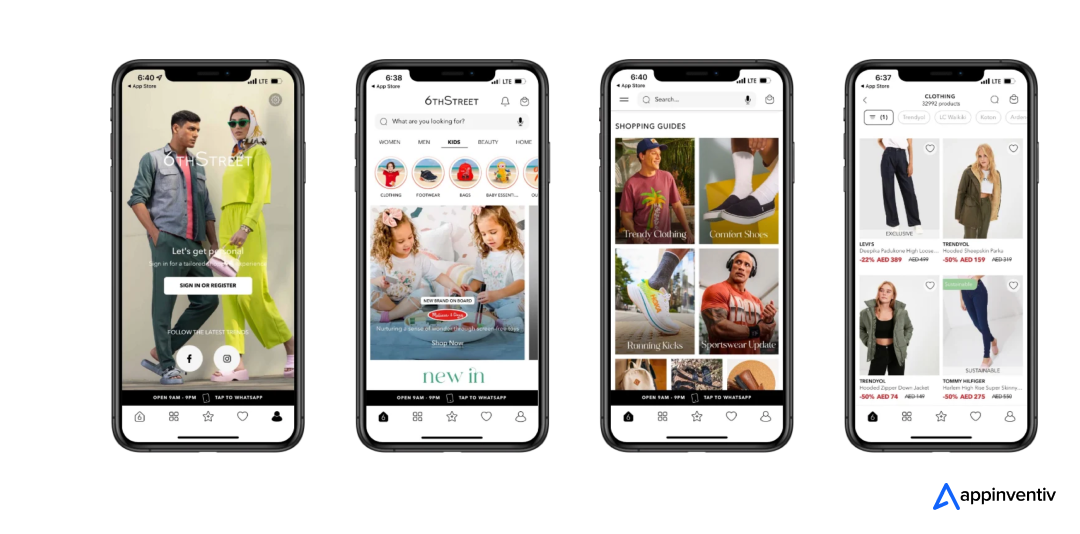
3. Edamama eCommerce App
Our team Edamama, a fully-fledged eCommerce app for mothers and their babies. The app was able to bag $5 million in funding, home-delivered 20k+ SKUs, and served 100k+ mothers.
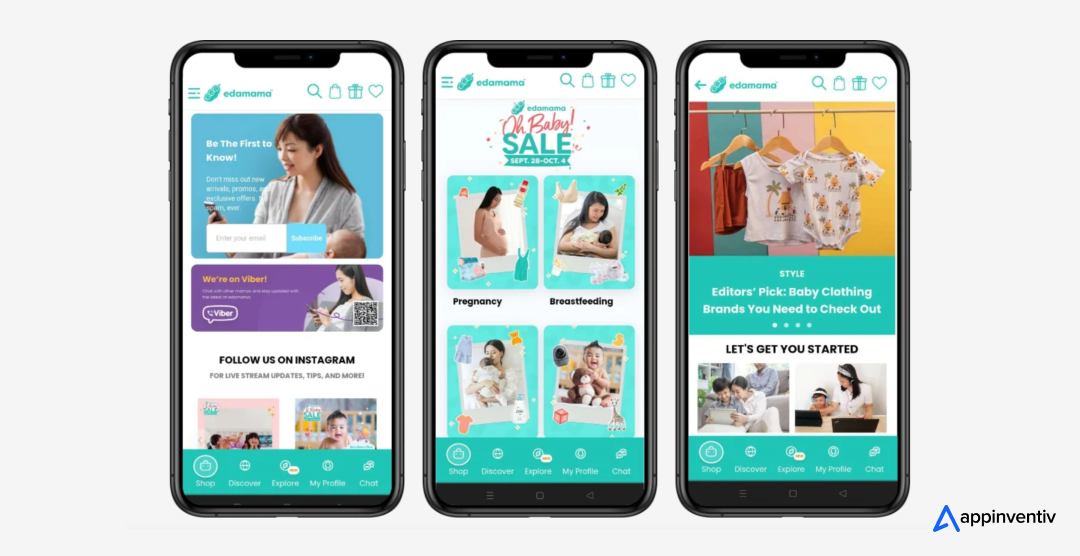
While these are our most notable clients, we have worked on multiple other use cases across the wide eCommerce space, making us the reliable digital partner of multiple startups and well-known brands. If you are looking for an eCommerce app development partner, get in touch.
FAQs
Q. How do I develop an eCommerce mobile application?
A. Developing an eCommerce mobile app starts with app conceptualization, designing app UI/UX, backend and frontend development, and app testing, followed by launch and continued maintenance. A leading eCommerce app development company with prior expertise in the field can help you streamline the entire process, avoid common pitfalls, and build a scalable, user-friendly app tailored to your business goals.
Q. How Much Will It Cost To Develop An ECommerce Mobile App?
A. The cost to create an eCommerce app generally ranges between $35,000 to $200,000. This depends on how complex the app is, what features you want, the design quality, and whether you are building it for Android, iOS, or both. Other factors like the level of customization, number of screens, and the team you choose (freelancers, in-house developers, or an experienced agency) can also affect the final online shopping app development cost.
Q. What is mobile commerce app development, and why is it important for businesses?
A. Mobile commerce app development refers to creating applications specifically designed for buying and selling goods or services via mobile devices, such as smartphones and tablets. These apps provide a seamless shopping experience with features like product browsing, secure payments, and personalized recommendations. Mobile ecommerce development is the need of the hour for businesses because it allows them to reach customers anytime, anywhere, increase sales through convenient access, and build brand loyalty by offering tailored user experiences.
Q. How long does it take to build an eCommerce app?
A. The time to build an eCommerce app usually ranges from 3 to 9 months, depending on the app’s complexity, the number of features, and how customized it needs to be. A basic app with standard features can be developed in about 3 to 4 months, while a feature-rich app with advanced integrations and a unique design may take 6 months or more. The timeline of mobile shopping app development also depends on the size of the hired team and how quickly feedback and approvals are given during the process.
Q. What is the required team size for developing an eCommerce app built to scale?
A. To build a scalable eCommerce app, you need a well-rounded team with specific roles that ensure smooth development and future growth. Here’s a typical team structure:
- Project Manager – Oversees the development process, timelines, and team coordination.
- UI/UX Designer – Designs the app interface and ensures a seamless user experience.
- Frontend Developer – Builds the parts of the app users interact with.
- Backend Developer – Develops the app’s server, database, and business logic.
- QA Tester – Tests the app to fix bugs and ensure quality before launch.
- DevOps Engineer – Manages app deployment, updates, and performance monitoring.
- Business Analyst – Helps align app features with business goals and user needs.
Q. How can you choose the best team for developing an eCommerce app – freelancers, in-house experts, or an external development agency?
A. Choosing the right team depends on your budget, timeline, and quality expectations. Here’s a quick comparison to help you decide:
| Option | Pros | Cons |
|---|---|---|
| Freelancers | Cost-effective, flexible | Less reliable, may lack team coordination |
| In-House Experts | Full control, aligned with company goals | High cost, slower to scale |
| Development Agency | End-to-end service, experienced team | Higher upfront cost, need strong brief |
Q. What is the Correct Monetization Model of an ecommerce app other than direct sales?
A. Apart from direct product sales, eCommerce app development can allow businesses to earn revenue through several additional channels:
- Subscription Model – Users pay monthly or annually for exclusive products or services. For example, getting curated boxes or premium delivery.
- Ads and Sponsorships – Ads and sponsorships are one of the major monetization models of eCommerce apps. Businesses can display sponsored products or run in-app advertisements for other brands in order to generate additional revenue.
- Affiliate Marketing – Brands earn commission by promoting third-party products and driving conversions through the app.
- In-App Promotions – Brands can charge sellers or vendors to highlight their products within the app.


- In just 2 mins you will get a response
- Your idea is 100% protected by our Non Disclosure Agreement.

In today’s digital landscape, you will hardly find a person who is not on social media platforms. Social media applications have completely changed our ways of communication. YouTube, Facebook, Instagram, LinkedIn, Twitter, TikTok. The list goes on and on. These social networking sites have the power to redefine the media, culture, education, politics, and business.…

Outsourcing product development is not just a buzzword or a futuristic concept; it is a present reality in the modern business world. What started as a trend during the COVID-19 pandemic has become a new norm for businesses across industries. The Grand View Research report indicates that the global business process outsourcing market will hit…

Creating a product that can gain instant traction in the market is seldom a straightforward process. Unclear objectives, vague user personas, inadequate documentation, and a range of other obstacles often impact the progress of ambitious businesses. As a result, about 35% of projects encounter significant setbacks and fail to overcome the challenges of the complex…







